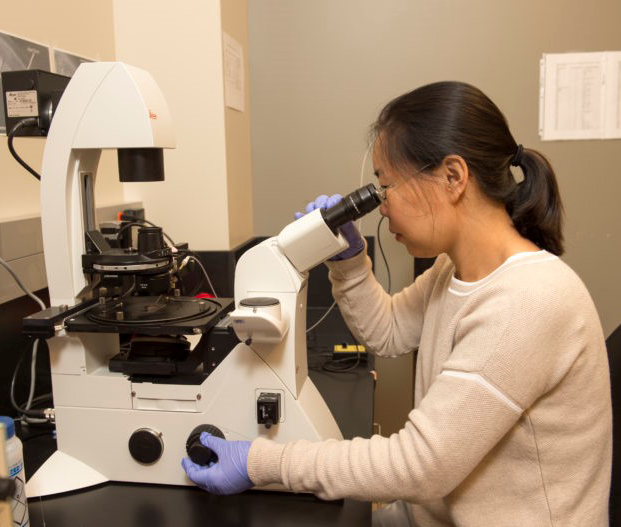
“If you want to pursue a career in science, it’s very important to foster a hardworking attitude, a creative mind, and critical thinking,” says Jingru Sun, Ph.D., an associate professor of translational medicine and physiology at Washington State University’s Elson S. Floyd College of Medicine in Spokane. Our interview with Dr. Sun highlights how her career path led her to research the way the nervous system regulates immune responses.
Q: How did you become interested in science?
A: In high school, I had an amazing teacher who introduced me to the scientific world, guided me to ask the right questions, and encouraged me to find answers by myself. I asked questions like: How do trees produce oxygen? How can we see bacteria through a microscope? Why are humans smarter than other animals?
Q: What was your path to becoming a researcher?
A: I received a bachelor’s degree in biochemical engineering and a master’s degree in genetics from Sichuan University in China. Then I earned a Ph.D. in microbiology at East Tennessee State University and completed my postdoc training in neuroimmunology at Duke University. In 2014, I became a tenure-track assistant professor at Washington State University and received tenure and promotion to associate professor in 2021.
Q: What do you study in your lab?

A: My lab is investigating how the nervous system regulates the immune system to keep us healthy. Human life is a balance between the dual threats of too little immune response and too much immune response. When infected with a pathogen, the innate immune system—our first line of defense—quickly activates microbe-killing and cellular stress-response pathways to eliminate the germs. These pathways must be tightly regulated to restore immune balance because too little immune response fails to stop infection, while too much can lead to prolonged inflammation, tissue damage, or even death.
Q: What do you consider your biggest accomplishment so far?
A: My postdoc mentor, Dr. Alejandro Aballay, and I pioneered this new cross-disciplinary field that uses Caenorhabditis elegans—a tiny roundworm—to study neural-immune regulatory circuits. Our research has inspired many other laboratories to conduct similar studies.
Q: What challenges have you faced in your career?
A: The COVID-19 pandemic has brought incredible challenges. Like many working parents, I found the transition to remote work in 2020 to be a tough one because it was difficult to balance that with parenting when schools were closed. I had to put in extra effort to do my job as well as take care of my son. The situation improved in 2021 but required working flexible hours for two 14-day stretches when my son’s class again closed due to COVID-19.
Q: What makes a career in science exciting?
A: What makes me excited is when I tackle a scientific question from different angles and levels (such as the molecular, cellular, or whole-organism level), and all the data make perfect sense with each other. That tells me I’m on the right track and going to make a new discovery.
Dr. Sun’s research is supported by an NIGMS Maximizing Investigators’ Research Award, R35GM124678.

